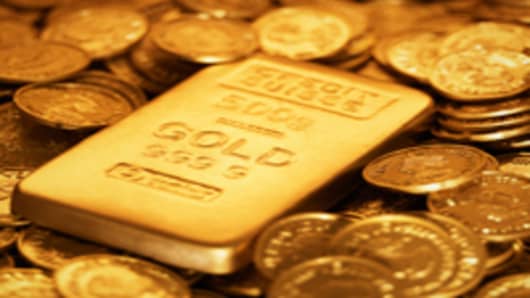Gold has outperformed all other core assets over the last ten years and the financial crisis has added fresh impetus to buyers of the precious metal, but now is not the time to jump into the gold market, Roubini Global Economics (RGE) said in a note to clients Wednesday.
"The concerns propelling the price of gold specifically are very real and should not be ignored. But is now the time for investors to jump the gold bandwagon? We wouldn’t encourage it," RGE said.
Gold has gained an average 15.3 percent per year in dollar terms since January 2001, the note pointed out. The precious metal is attractive to investors concerned about high inflation, persistent deflation or the risk of a global financial meltdown, the note added.
"Our core economic forecast scenario does not entail any of the extreme events that could result in a major gold price spike, and given the fact that the metal has already surged in price, we see several potential downside risks," the note said.
RGE said that high inflation in the near term is unlikely, given the lackluster growth in the major economies and the Federal Reserve's willingness to manage the supply of money into the economy.
Meanwhile, even though deflation risks do remain, which could lead to gold buying, Fed Chairman Ben Bernanke has signaled a readiness to print money to avert a period of sustained deflation, the note said.
The risk of a widespread financial collapse hasn't gone away either, which could see gold prices going higher in the near term, RGE concedes. But the factors likely to drag on the price of gold outweigh the chance of a spike, according to RGE.
"There are certainly financial storm clouds to worry about, not least because of sovereign debt concerns in the euro zone," the note said. "Given this, we think it is possible that gold could continue to trend upward for a period. We still are not recommending it, however, due to what we see as significant downside risks."
The downside risks were outlined by RGE Chairman Nouriel Roubini in December 2009, the note pointed out.
Firstly, the dollar-funded carry trade could unravel, which would pop asset prices including that of gold, the note said. Secondly, when central banks decide to end quantitative easing and raise interest rates, it could see demand for gold decline. And thirdly, the "herding" mentality that led to gold's rise could quickly be reversed.
An additional downside risk comes in the form of gold-linked financial instruments such as exchange traded funds (ETFs), which "could suffer due to increased fears of counterparty risk," RGE said.
"Investors should thus take note, while gold and financialized gold products have posted consistent returns over the past decade, there are no guarantees that this golden goose will continue to lay eggs," RGE said.
Not all market watchers think that gold prices are likely to decline. Davis Hall, head of forex and precious metals private banking at Credit Agricole, told CNBC on July 2 that the precious metal will end the year higher.


